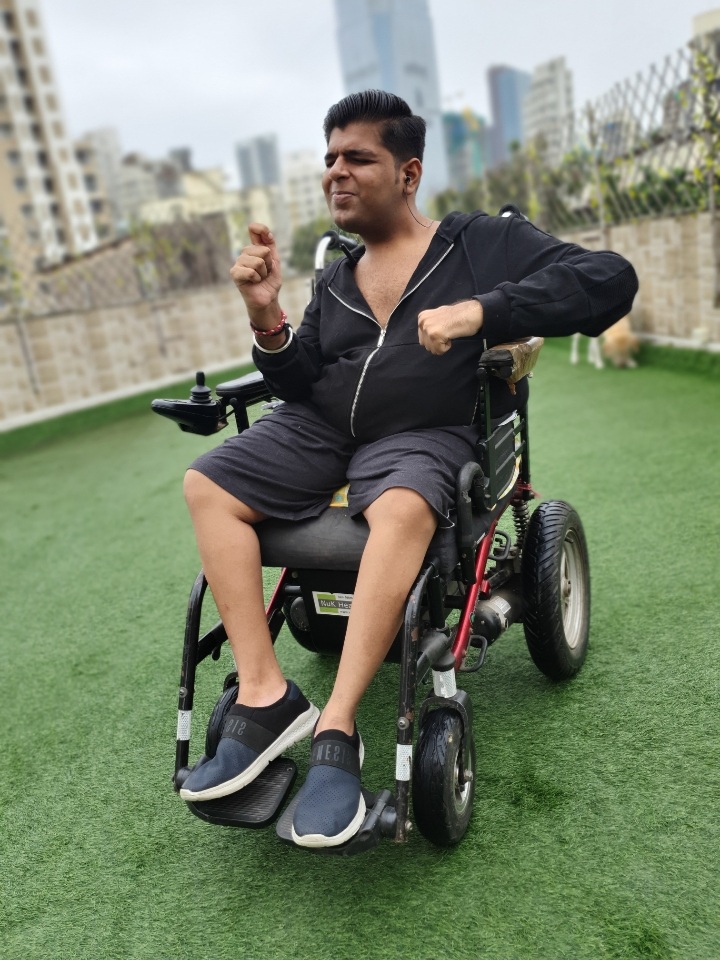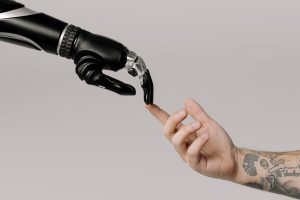Karan Shah is the founder of Pawsitivve Future and an animal behaviourist who trains dogs to be assistants and therapy dogs. In this interview for Success & ABILITY, listen to Karan as he talks about his journey as a person with Spinal Muscular Atrophy (SMA), as a dog trainer and the miracles that dogs have brought in his life and in the lives of those around him.
Interviewed by Yashasvini Rajeshwar (YR), Deputy Editor, Success & ABILITY
YR: Good afternoon and welcome to the latest video interview from Success & ABILITY. We are here today in conversation with Karan Shah, Animal Behaviourist and Founder of Pawsitivve Future. Thank you so much for joining us here today, Karan. [It is] so lovely to speak with you.
KS: Thank you for having me over and giving me this lovely opportunity.
YR: So let’s just get started at the very beginning. We know that you run Pawsitivve Future, we know that you’re a dog lover and [that] you work a lot with animals. We know that you’re a person with Spinal Muscular Atrophy (SMA). Why don’t you just run us through who you are?
KS: So I didn’t get the last part.
YR: I just said that we know that you run Pawsitivve Future, that you are a lover of dogs, [that] you work with animals and that you are a person with SMA but why don’t you run us through your life in a little more than a minute or so, maybe?
YR: Okay, so I am currently 23 years old. And as you all know, I’m suffering from Spinal Muscular Atrophy (Type 3). I have been in this field for the past eight years and my main goal over here is to bring awareness on something called assistant and therapy dogs. You know, awareness especially in a country like India is less, so our main goal and our main motto is to bring awareness over there.
YR: Okay, and how did you get started on this path? What helped you kind of take that leap?
KS: Okay, so what happened was when I was 12 years old, I had lost my elder brother Mihir. He was 13 that time, he was one year older to me. And when I had lost him, I went into severe depression and started having anxiety issues. So during that timeframe, I also left my schooling. I did home schooling, and basically I went in a shell. Okay, one day or just a family friend, Mr. Shyamak Davar, he just came over, and he just said that this house needs a dog Karan needs an Angel in his life. And the very next day he just gives a call to my mom saying that you know, listen don’t get angry stay calm, just calm down. Okay, I’m sending in a pup for Karan and that pup is required in Karan’s life. So just trust me with this. And of course, then Angel (the dog) came into our life. And Angel came into our life, what happened was, you know, we started needing a trainer in our life, because, you know, of course she started pooping and peeing everywhere. And because she was teething she started biting us and we honestly did not know how do we deal with dogs. So we started searching for trainers and all of a sudden my mom realised that my elder brother Mihir he had seen some assistance dog show in his school Balmohan Vidyamandir in Mumbai. So that time mom just told me that there was this one lady who had done something in Mihir’s school who trains especially for people with special needs. So try contacting her. So of course I you know, like Google Baba, it’s the most convenient way to get in touch with someone. So I Googled out I came in touch with Sherin auntie, and I called her over one day and I told her that, you know, this is the problem I need a dog you know, whom you can train as an assistant dog to make me independent. So I asked her that you know what all things can you do? So she said that we can train Angel to do you know, open the cupboard, put on a blanket, remove your shoes, remove your socks, loading clothes in the washing machine, pick up any item and put them in the dustbin and a lot of things. And the moment I heard this, I went like super excited. Okay, and that time out of excitement I asked her okay, wow, you know, that’s really fantastic. When can we start training and what are your charges? So she’s like, I’m sorry, I’m not going to train her. I’m like, what? Like, you are supposed to train and she’s like, no, you want an assistant dog so you will have to train her and I was like, I’m sorry, but I have no knowledge on this. And then she offered me to join her course. The course is called basic, you know, trainers course. So that course basically teaches you how do you train dogs? So I did that course and under her guidance, then we started training Angel for a lot of new commands and new things to do. And while training Angel, that time I realised that you know, my depression had disappeared, my anxiety had disappeared out of the blue. And I realised that at least after a year, a year and a half because I had to take Angel for walks and of course, you know, knowing that it’s a cute friendly pub, there will be 10 people coming and cuddling the pup. Plus I live in an area in Dhadar near Shivaji Park where there are all dog lovers. So you know, interacting with people started increasing and I did not realise, you know, [how] I was in a shell and how I became completely opposite of that. And you know, that was the time I realised that okay, this is my call in nature, that is my calling in life, and this is what I have to do. So that is how I got into this.
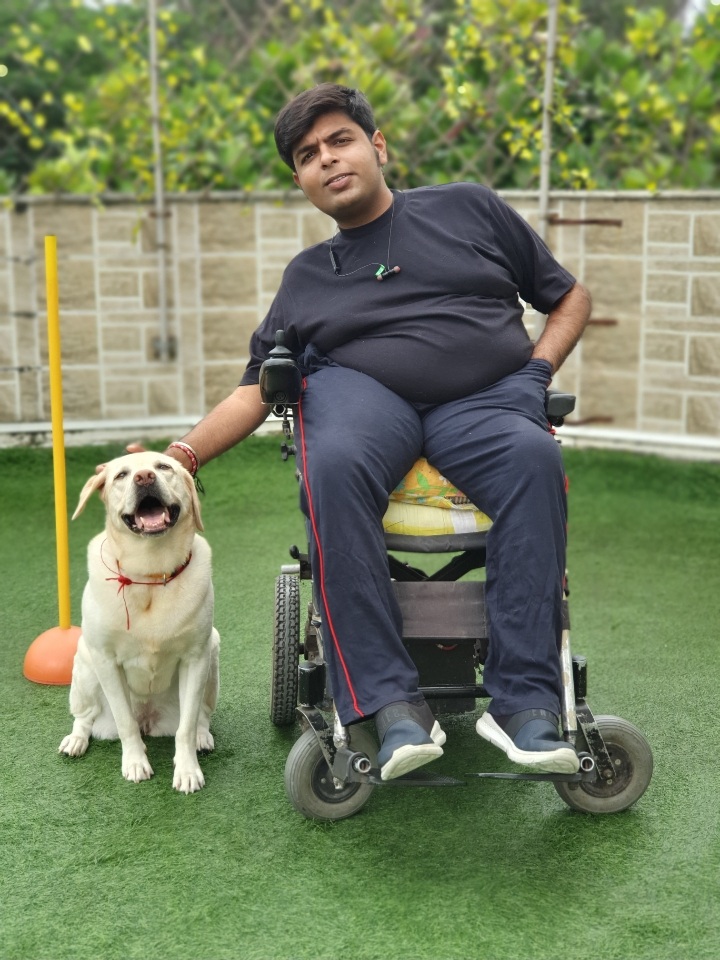
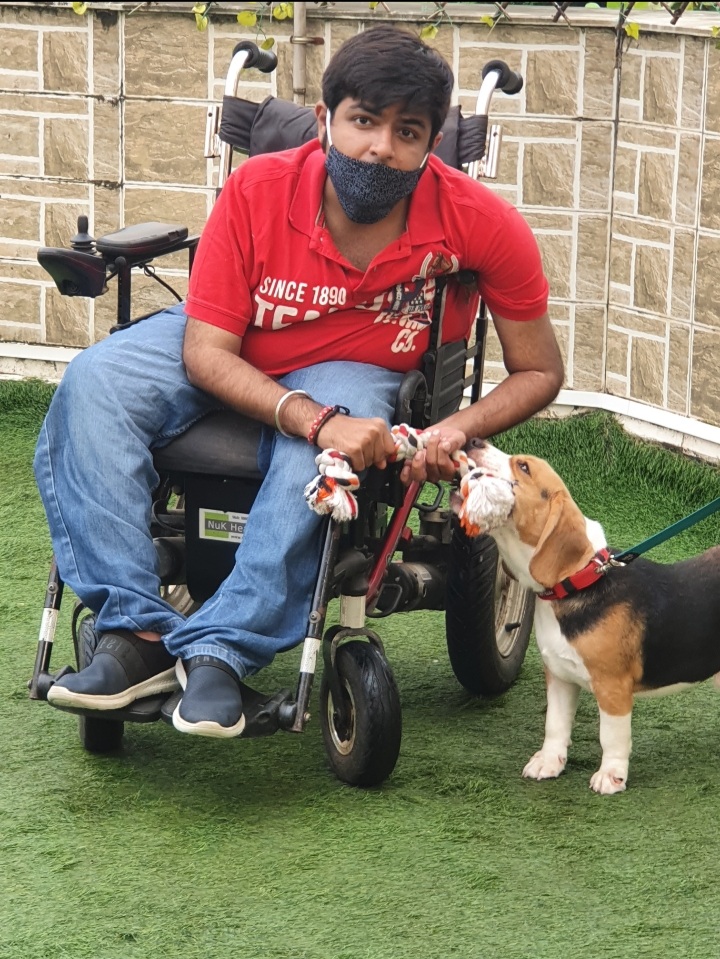
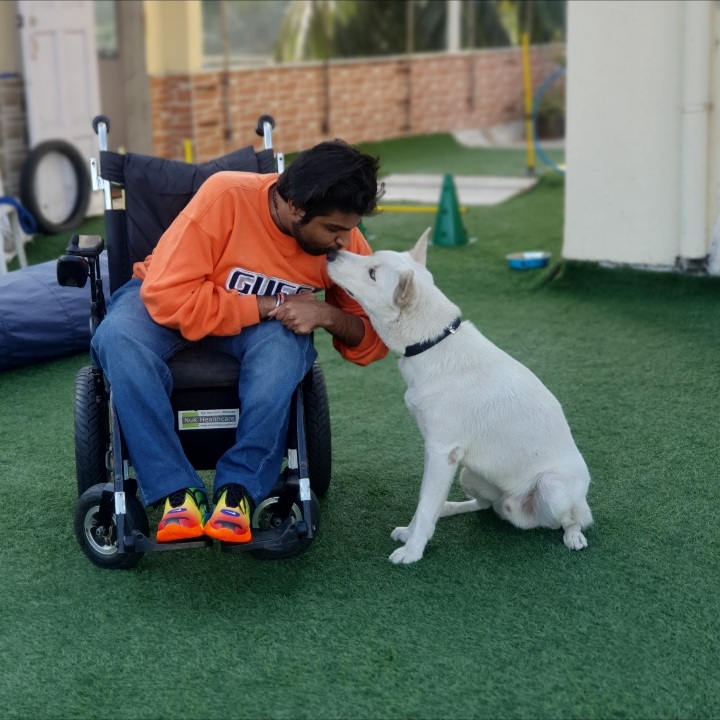
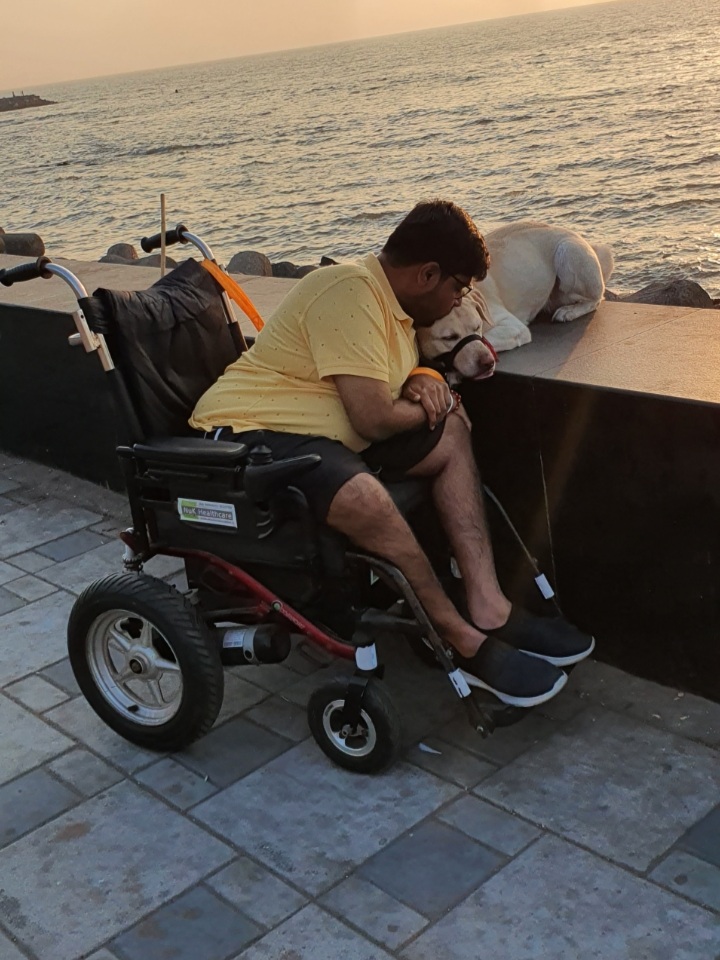
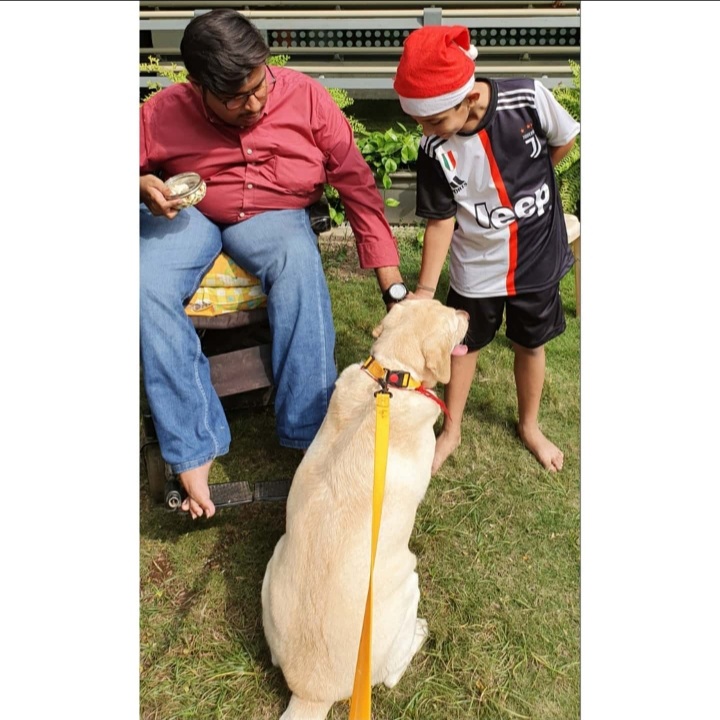
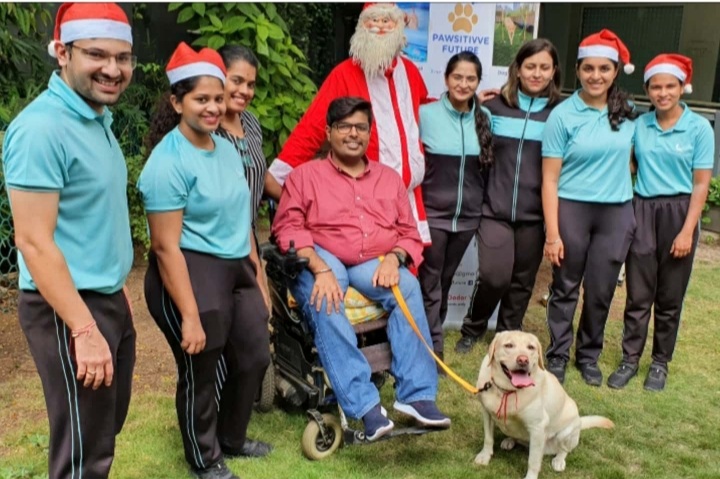
YR: I don’t think I’ve heard of dogs being trained to load washing machines before and I can imagine why that was very exciting. But why Pawsitivve Future? You mentioned that you realise it was your calling in life but what has that journey been like? How many years has it been? How many dogs have you trained?
KS: So dogs I must have trained… I don’t have a count of it, but at least [there] must be about 150-200 dogs so far. And so what happened was, once we started training Angel as an assistance dog, there were times that you know, we started going to schools [and] colleges to raise awareness on the same. And then I had got this one opportunity where they were all cancer patients. It was an NGO and we were just offering a free service over there. And so we started this workshop called ‘Paws and Kids’ workshop. So there was a team of Angel and another therapy dog named Leo. So we went over there and I saw the kids playing over there, the enjoyment, you know, with the dogs and the happiness on their face. And you know, sometimes you know, money does not matter – whether you get it or not, but that smile on the kids’, you know, on their faces gave me that satisfaction at work. Yes, you know, like you feel proud of yourself for doing something. And that was the time I’m like, Pawsitivve Future [was born] because Angel has made my future positive. So let me make, you know, futures positive for at least another few people.
YR: Can you tell us your favourite story from Pawsitivve Future? Something you witnessed [or] some feedback you’ve received [or] the dog that stayed in your imagination the most?
KS: Okay, so Angel and I, we both go to Worli Sea Face very often for walks. So over there are a few older guys, okay. Like now, they are very good friends of mine. But earlier whenever we used to go over there, you know, these people used to come over there, they [would] sit and smoke all the time. Okay. And once what happened was I took Angel out on a long leash, and we were just walking and Angel all of the sudden went over the front of those people, all over about five or six of them and she just jumped on them. All of a sudden I’m like, oh *** , no, you’re not… this is not happening. And she just jumped on them. And luckily those people are like “we cannot smoke in front of a dog. It is harmful for them” and they put out their cigarettes. And then they just… then I went over there, apologised and they’re like, “no, no, it’s completely fine. Your dog is super sweet.” and everything. And these random questions, you know, how are you, what’s your name and all of that. And then, since that day till date, whenever I go over there, all of those four people will come instead of smoking. Okay, one of them has quit smoking because of Angel. And whenever we go over there for walks, they all will walk for at least two or three kilometres along with the Angel and me.
YR: That’s an impressive story. If you have a dog that makes people quit smoking [and] that does your laundry – it’s a superpower, I must say! But tell me more about you and Angel. What have you learned from Angel? How have you grown together? What’s your favourite Angel lesson?
KS: My favourite Angel lesson? So there are many. But one thing I could say is that the satisfaction that I never got from humans, I got it from a dog. The love that I never got from humans. I got it from a dog. The understanding I never got from humans, I got it from a dog. You know, like, when I was in depression or something, of course I’d lost my brother and everything. But, you know, during that time when I needed someone to hear me out, the only person, the only soul who was present with me was Angel. You know, with Angel, it actually feltlike someone is listening to you. Okay, so like, whenever I used to talk to her she was, you know… [she] used to stare with puppy eyes like means like, you know, “you’re a ***. It’s okay, continue.” Okay, and you know, till date if any bad incident happens with me or anything. The first person that I will go to and I will talk to is Angel. Okay, no matter whatever she must be telling me you know. I know one thing that she is listening to me. If I need someone, you know, maybe no one else will be there. But Angel’s always going to be there. So every night we have these deep conversations and I’ve actually made it a point and I also tell my clients over here that, you know, learn to talk to your dog, learn to, you know, communicate with them. They also communicate with a different manner and every night talking out to a person you know, it’s not compulsory [that] it needs to be a human. This, you know, ranting out your feelings every night and sleeping peacefully.That is what I’ve learnt with Angel, that every night you talk about your day and have a peaceful night.
YR: Before I come to the training part of it, which I’m very curious about, one more question about you and you know, your journey. You’ve spoken about your mental health journey, I was reading about how you dealt with inaccessibility in schools, you know, [and] you [have] spoken about your brother. What helped you gain confidence? Do you have a role model in your life? is Angel your role model?
KS: Of course, Angel is my role model, and also my parents, no doubt because they have always supported me to choose the right part in my life. Even if I wanted to do dog training, they were not like those parents [whp] were like “seriously, do you want to do dog training? How are you going to get a living out of it?” They were not those types of parents. So my parents have always supported me. They have always guided me. The second go-to person in my life would always be my parents, Sherin aunty and Shiamak Davar, who have you know, always supported me and brought me to this stage. You know, if Sherin aunty and Shiamak Davar were not there in my life, today, I would have not been where I am.
YR: Tell me about the role of your disability in your journey. You’ve spoken about mental health a lot, but what has SMA been… how has SMA been a part of your journey?
KS: So when my elder brother and I were born with SMA, you know, my parents were shattered. That you know, poor kids have this disability and you know, when they become parents, they have these big dreams. And my parents always had that dream that, you know, when we have our children, one will go to the Army and the other will go to the Navy. That is always [the] thought in their mind and I honestly… I’m a big Army fan. But when they came to know that, you know, that child has SMA… You know what affects the child the most is when your own parents start giving you that sympathy and empathy in your life. That actually weakens you more. My parents have been the parents who have told me “you have SMA, f*****, you know that is the case. Okay, it’s done. It’s over. Think of what do you have to do?” You know, if I am facing a problem, okay, like if someone will come and hit me, my dad is not going to be the person [to say] “it’s okay. I will come in and support you.” Dad is like “that person has hit you. It’s your problem. Go and slap him back.” Okay, so my parents have always given me that push of being independent. Okay, and they have always also made it a point, you know… I honestly do not feel I’m disabled. I honestly do not feel I have SMA because of my parents. So I would not say SMA has given me any issues in my life as such. Actually, I would say I’m blessed to have SMA. I’m blessed to be disabled because if I was not disabled today, I do not know where I would have been. It is that my disability… Because of my disability, because of the problems that I have faced, I have grown so much, and I’m, you know, giving back to the society. What I have learned… So, I’m definitely proud of myself and I’m happy that I have SMA. No regrets in that.
YR: I mean, there’s so much confidence to be learnt from this story of how much one can do and how much just having a passion can define your life.
KS: Sorry, I was going to mention this one incident about disability that had happened. So my brother was a very huge cricket fan. Okay, and so earlier we used to go to Shivaji Park very often just to have rounds and everything. And in Shivaji Park, many people knew us because we were two brothers on wheelchairs always going around together and everything so people knew us very well. And I also used to love to play cricket. I was not a cricket fan, but I loved to play cricket. Okay, so once they were this group of people, you know children playing cricket and everything and I just went and I approached them [asking] “can we play cricket with you?” So [at] that time that guy said in Hindi “tu to langda hai, tu kya cricket kelega?” [You are disabled, what cricket will you play?]
Okay, so that time my brother gave a very good response to them – hum to hai langde lekin per se, tum log langde ho tumare soch aur vichaar se.” [Yes, we are disabled but physically. You are disabled in your thoughts and ideas.]
And you know, that hit me so good that I realised that you know, disability is just physical but not a mental state of mind. So till the time you are mentally strong, there’s nothing in the world that can stop you from achieving your goals.
YR: Right. That’s a powerful story. My last question to you is about dog training in itself. It’s, uh, you know, dog training 101 kind of a question. What are some of the basic principles of training a dog to be a support animal? Are there different training needed for different disabilities? How does that work?
KS: Okay, so there are different types of training for different disabilities, you know, [to] cater to different people. Like in my case, I need an assistant dog that helps me to do my day-to-day chores. But now, say for example, if I get a child who has dyslexia. So I had dyslexia earlier, so what used to happen is, for example, if I had to say “my name is… kkukk…” I start murmuring in the classroom and everyone starts to laugh at us. That has happened with me as a person in my childhood. So now what we do is we train that dog that whenever the child starts murmuring you go and hug the child from behind. You start licking the child and you encourage the child to read more. Okay, so, training varies from person to person [and] disability to disability, whether it be physical or mental, but one thing required in this field is a lot of patience. And a lot of unconditional love.
YR: I suspect that the nuances of training will be an independent conversation altogether. But this brings us to the end of this one. Thank you so much for joining us, Karan. It was such a pleasure talking to you. And you have a very vivid way of telling your stories. I must say.
KS: Thank you. Thank you
